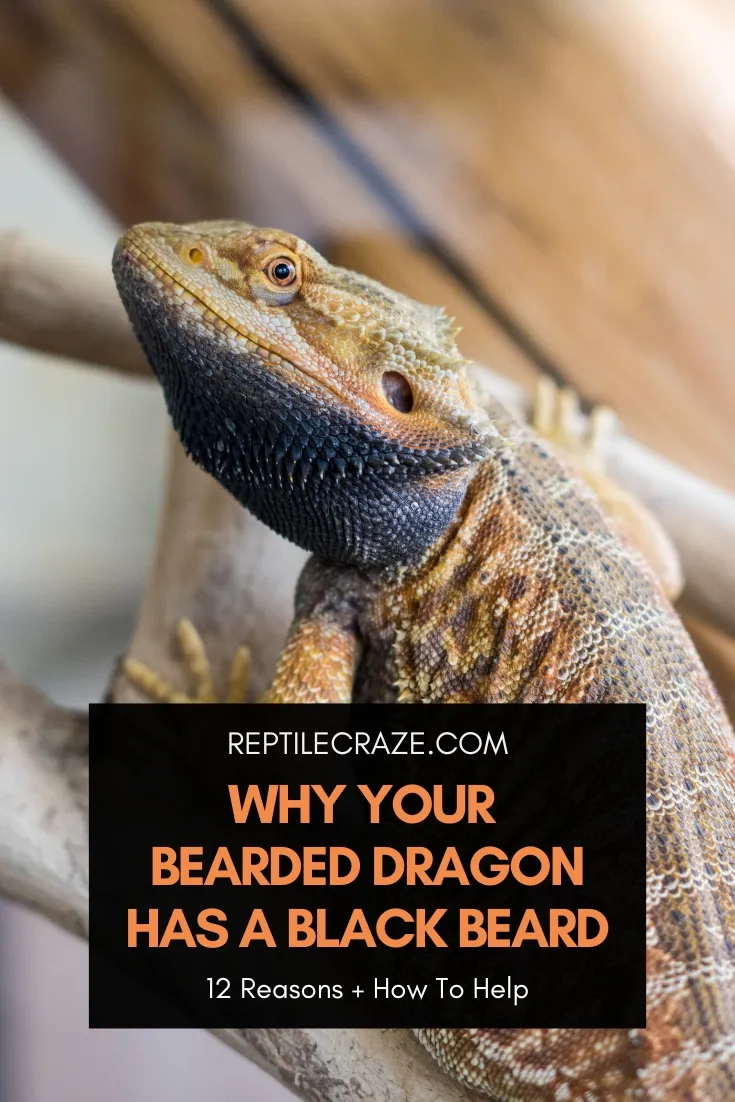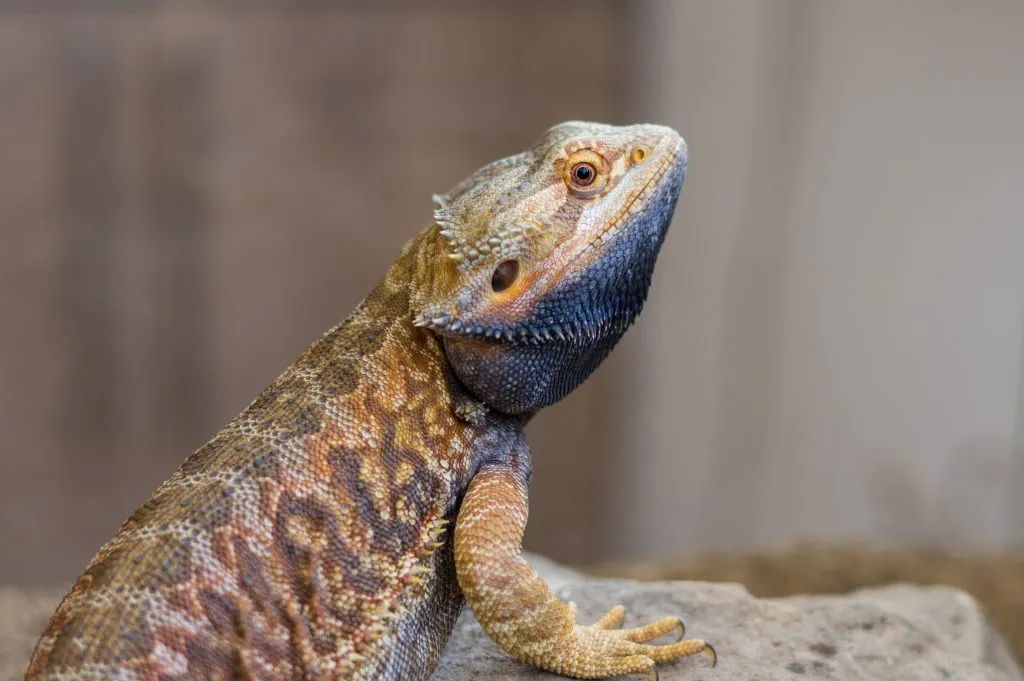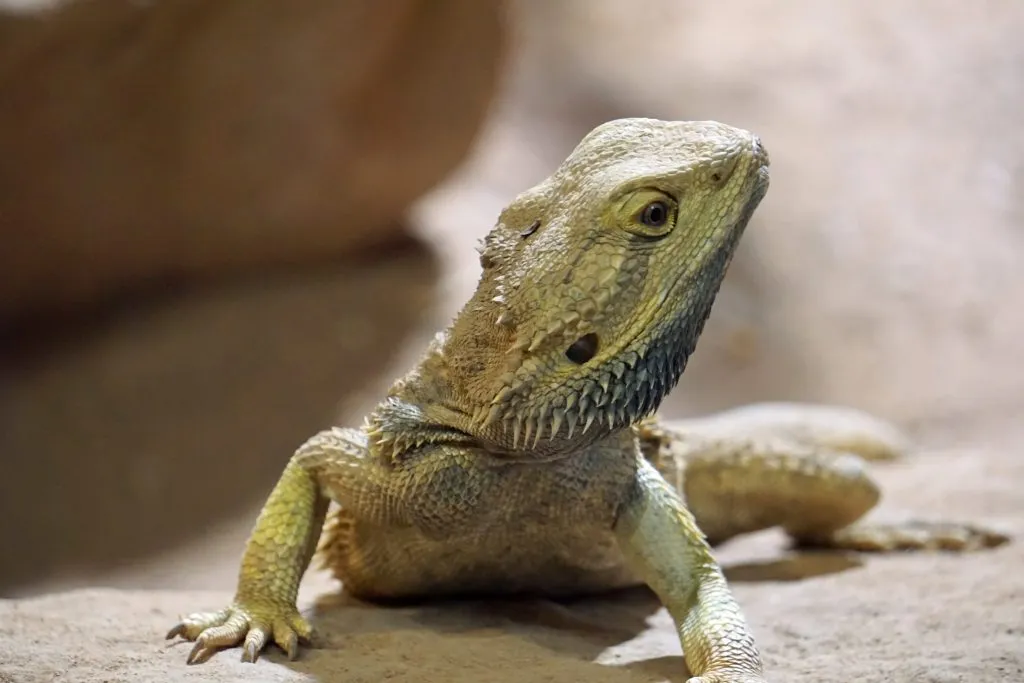
As a bearded dragon owner, it’s normal to feel concerned about your bearded dragon’s health. This is especially true if you notice something out of the ordinary, like your bearded dragon’s beard turning black. That said, is this truly something that you need to be worried about?
A bearded dragon’s black beard can be caused by a wide range of factors, most of which have something to do with their environment, emotions, or mental state. But while it’s usually only temporary, it’s important to figure out the cause so that you can make the necessary changes.
In this article, we’re going to talk about all the potential reasons why your beardie’s beard turned black. Let’s dive right in!
Table of Contents
12 Reasons Why Your Bearded Dragon Has a Black Beard
Bearded dragon beards tend to change in color as a natural response to what they’re feeling. Unless the issue persists for an extended period of time, there’s generally nothing to worry about.
However, knowing the exact cause is still important if you want to prevent it from becoming something serious. Without further ado, here are 12 potential reasons why your bearded dragon has a black beard.
1. Threat response
A rapidly darkening beard is a clear sign that your bearded dragon, whether male or female, feels unsafe or under threat.
This response is often combined with “beard puffing,” and beardies typically do it to scare off predators or potential rivals. It works because a darker jaw area makes them more threatening and intimidating to other animals, particularly other bearded dragons.
Here are some reasons why your bearded dragon may feel threatened or scared:
- Potential danger. This could be due to the presence of larger animals like cats or dogs in close proximity.
- Another male. During mating season, bearded dragon males will compete for females. Threat displays such as beard darkening allow them to ward off other males that may be a potential threat.
- Another bearded dragon. In general, bearded dragons are very territorial animals, and they hate sharing space with other beardies, regardless of their sex. As naturally solitary reptiles, they’re prone to feeling threatened in the presence of other bearded dragons.
2. Mating display
If your male bearded dragon is older than six months, you may also notice its beard turning black around spring or summer, which is when most bearded dragons enter the mating season.
There are two main reasons for this. One is they’re trying to ward off potential rivals, as mentioned above. The other is simply to impress a female beardie with this mating display and hopefully get chosen by her.
If it’s truly a mating display, you should also see their head vigorously bobbing up and down. Both male and female bearded dragons do this as part of their courtship behavior, though females tend to be more subtle about it.
Keep in mind that your beardie may still do this even if it’s completely alone in its enclosure. After all, instinct is instinct, and bearded dragons will do their best to follow it.
3. Stress
Stress is one of the most common reasons why a bearded dragon shows a black beard.
Beardies are sensitive creatures, and they can easily become stressed due to various factors. These include sudden changes in the environment, too little or too much handling, and overcrowding, among many others.
If you think your bearded dragon is stressed, make sure you look out for other symptoms. This includes:
- Stress marks
- Glass surfing
- Rapid mouth opening and closing
- Frenzied clawing at
tank sides - Extreme lethargy
- Loss of appetite
- Diarrhea
- Change in coloration
- Refusal to bask
If you see these symptoms in addition to a black beard, it’s likely that your bearded dragon is stressed and needs help.
4. Physical illness

If your bearded dragon has a black beard, sickness may be another possible reason.
Any physical illness your beardie is feeling can cause them extreme stress. As discussed above, stress is usually the root cause of a black beard, so the two often go hand-in-hand.
Keep in mind, though, that black beards are not always a definitive symptom of illness in a bearded dragon. You should also look out for other symptoms, such as:
- Changes in appetite
- Reduced activity levels
- Lack of coordination
- Digestive issues
- Nose or eye discharge
For instance, a bearded dragon turning black and not eating is a good indicator that there might be something wrong with them health-wise. Make sure you get them checked by the vet as soon as possible.
5. Pain
It’s also possible that your bearded dragon’s black beard is actually a sign of pain or discomfort.
You may have noticed your bearded dragon becoming more withdrawn and spending more time hiding. This could be because they’re feeling sick, injured, or just generally uncomfortable, which is why you can sometimes see a bearded dragon sleeping with a black beard.
Pain can also cause bearded dragons to become restless as they search for a comfortable position. This can cause them to become stressed, leading to their beard darkening in color.
6. Bad environment

Poor environments can cause a lot of problems in many animals, including bearded dragons.
Factors to consider include temperature, humidity levels, and lighting, as well as ample space to roam and climb. Bearded dragons may start displaying a black beard if these needs aren’t met.
Here are some environmental conditions that can trigger this stress response in your bearded dragon.
- Poor lighting. Bearded dragons need plenty of UV light to keep their bodies healthy. Inadequate lighting or frequent cycling of lights in your beardie’s habitat can lead to stress and discomfort.
- Wrong temperature. Beardies need to be kept in an environment between 75 and 85 degrees F (24 to 29 degrees C) for optimal health. If the temperature is too high or too low, it can affect their health negatively.
- Humidity problems. Your bearded dragon’s habitat should have the right humidity levels, with no sudden changes or spikes. Keep it between 30%-40% to emulate their natural habitat.
- Noisy surroundings. Beardies hate many things, and a noisy environment is one of the worst offenders. They can even feel the vibrations if the noise is loud enough, further stressing them out.
- New habitat. Bearded dragons don’t typically wander far from home. Due to this, they can become stressed when they’re moved to a new habitat.
7. Boredom

Although bearded dragons are solitary animals, they do engage in social activities to some extent. One study exposed bearded dragons to a demonstration of a particular action.
Afterward, the beardies were able to replicate it, showing that they’re capable of discerning social cues and can learn by imitating others.
This means that bearded dragons can get bored if they’re not given enough stimulation or enrichment activities in their environment.
So, if you’re asking yourself, “Why is my bearded dragon’s beard black but not puffed out?” then boredom might be the answer.
8. Overstimulation
On the other hand, while bearded dragons can tolerate being handled and played with, they can only take so much stimulation.
A bearded dragon developing a black beard while you’re playing with them is a sure sign that they’ve had enough play time for the day and would now like to be left alone.
Tip: Read this article to find out if your bearded dragon likes you!
9. Brumation
Brumation is an integral part of the lifecycle of bearded dragons.
It’s a process similar to hibernation that many reptiles undergo, except they’re usually only inactive for days or weeks rather than months. Also, they’re still semi-aware of their environment.
During this period of inactivity, bearded dragon behavior can change significantly. They become more sluggish, their appetite decreases, and they may even have difficulty moving around.
Bearded dragons tend to display a black beard right before and right after brumation. This is just their body responding to the changes in temperature and hormones.
11. Thermoregulation
If you find yourself asking, “Why is my bearded dragon’s beard black in the morning?” then you may want to learn more about thermoregulation.
As cold-blooded reptiles, beardies rely on external heat sources to regulate their body temperature. Since black absorbs more heat than lighter colors, they will make their beards black to draw in more warmth.
Additionally, puffing out their beards can trap warm air and hold it close to the bearded dragon’s body.
If your bearded dragon is feeling too cold, you may want to get a high-quality heat lamp (like one of these) to avoid them having to dark their beards just to be warm.
11. Malnourishment or dehydration
Bearded dragons may also develop a black beard due to poor nutrition or dehydration.
It’s not as common as the other reasons on this list, but it can happen if you haven’t fed your beardie in a while. Excessive hunger and thirst can be stressful conditions for any animal, and your bearded dragon is no exception.
If you’re going to be away for an extended period of time, make sure that your bearded dragon is properly cared for.
12. Bad mood
Lastly, bearded dragons may also display a black beard due to changes in their mood.
Beardies have personalities of their own and can get cranky like any other animal. If they’re not feeling well or don’t like something you’ve done, they may puff out their beard and turn it a dark color as a warning.
Keeping Your Bearded Dragon Happy
Bearded dragons are fascinating creatures, and learning about them and their little quirks is part of what makes raising them so enjoyable.
Fortunately, making sure that your bearded dragon is happy and healthy is quite straightforward. Just pay attention to the signs they give you and provide them with the right environment, nutrition, and enrichment!
- Enchi Ball Python: A Unique and Stunning Morph of Python regius - March 27, 2025
- Emerald Tree Monitor: The Enigmatic Green Guardian of the Rainforest - March 26, 2025
- The Egyptian Cobra (Naja haje): A Fascinating Serpent - March 25, 2025
